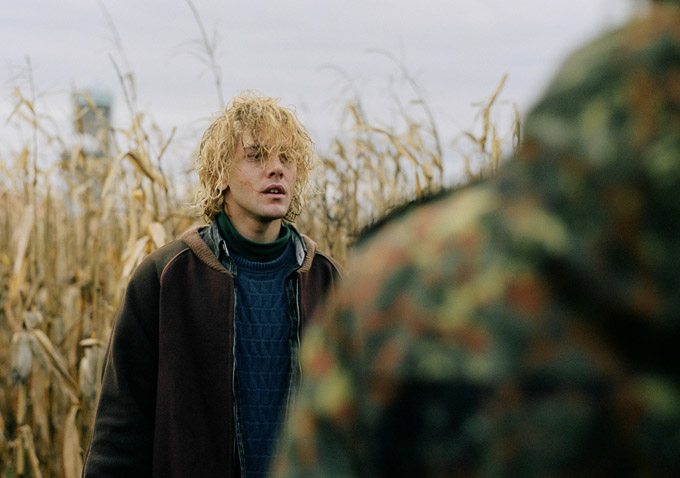
Few filmmakers in modern times have had such a meteoric rise at such an early age as Xavier Dolan. The French-Canadian wunderkind, a former child-star (and still occasionally a voiceover actor for local dubs, with roles including Ron Weasley in the ‘Harry Potter‘ films) premiered his first film at Cannes aged only 20, and has returned to the festival twice more, rising up through the sidebars with "Heartbeats" and "Laurence Anyways."
Now at the grand old age of 24, Dolan is on his fourth feature, which marks something of a break in tradition. Not only is he premiering his latest, "Tom A La Ferme" (or in English, "Tom At The Farm") at Venice rather than on the Croisette (and, for the first time, in competition), but the film also marks the first time he’s gone into genre territory—at least in part.

Having taken a break from appearing in front of the camera on "Laurence Anyways," the director again takes the lead role here as the titular Tom, who we meet driving out to the equally titular farm (scored to an amazing French version of "The Windmills Of Your Mind," famous for its use in "The Thomas Crown Affair"). He’s there for a funeral, seemingly of his boyfriend, but his beau’s mother, Agathe (Lise Roy), isn’t just unaware that her son is gay, but is expecting a girlfriend to come and pay her respects.
Remaining in a state of blissful ignorance, Agathe welcomes Tom in, but her eldest son Frances (Pierre-Yves Cardinal) is less friendly: he was aware of his brother’s sexuality and orders Tom to leave immediately after the funeral. But he softens, and the visitor ends up becoming part of the furniture, becoming a surrogate son to Agathe, and engaging in a strange semi-sadomasochistic friendship with Frances, who may be less heterosexual than he initially tried to give the impression. But it can’t last forever, and the arrival of a fourth party, and revelations about Frances’ past, bring things to a head.
More than anything else, "Tom A La Ferme" is reminiscent of the work of "Strangers On A Train" and "The Talented Mr Ripley" author Patricia Highsmith. The sexuality might be a little less subtextual (though there’s nothing explicit here), but the testy, shifting power plays in the relationship between Tom and Frances, which serves as the heart of the film, bring to mind a contemporary update of Highsmith’s work, albeit seen through Dolan’s lens, making it of a piece with his earlier films, particularly once Sarah (Evelyne Brochu), the co-worker posing as the late Guillaume’s girlfriend, arrives on the scene to complicate things further.

Even before then, it’s a strange and complex relationship in a strange and complex film. And we have to say that between that, and the bruised maternal love of Agathe (with Roy giving the best performance in the film), it works better as a family drama—or even melodrama—than as a straight-up thriller. Dolan shifts into a different aspect ratio for the more suspenseful sequences, which only seems to cement the idea that he’s making a film of two halves, while elements like a horrific faceless figure that the protagonist dreams of and Tom undergoing a kind of Stockholm Syndrome, are introduced without ever quite going anyway.
Gabriel Yared‘s score is also bold and lush, but sometimes seems determined to force suspense where there doesn’t appear to be any, and the ending felt a little rushed and abrupt for our tastes. But some of these criticisms are a little predicated on Dolan having made a pure genre picture, and that’s certainly not his intention—he’s not simply aping Hitchcock, Clement and Chabrol (to name but a few), but melding them with his existing style and concerns. And while the mix didn’t entirely work for us, that’s not to say it isn’t exciting to see him grow in that way.
And indeed, the film marks his growth in all kinds of ways. We’ve found him a little awkward as a performer in his own previous films, but he gives a strong and even likable turn here (matched blow for blow, often literally, by the excellent Cardinal). And it’s his most expansive and impressive work visually too, with the photography by "Incendies"’ Andre Turpin taking full advantage of the rural landscape and claustrophobic interiors.
We might not unreservedly love the film, as has been our experience with previous Dolan films (confirmed fans may well have a better time with it). But it’s certainly his best film, and if he keeps growing at this rate, it’s only going to be a matter of time before he comes up with something we really cherish. And in the meantime, it’s great to sit back and watch a fascinating filmmaker continue to find his voice. [B]
Browse through all our coverage of the 2013 Venice Film Festival to date by clicking here.

